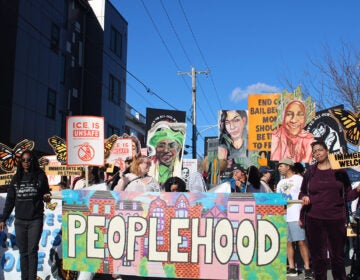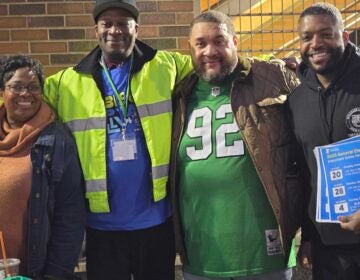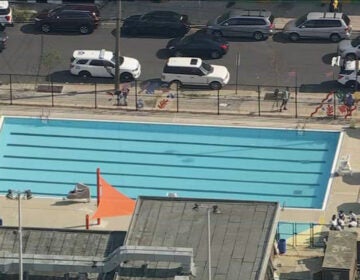Public safety, trust depend on work of police and community both
NewsWorks hosted a public discussion on Nov. 17 at WHYY studios about the relationship between the police and the communities they serve. Four guests shared personal stories.
NewsWorks presented a public discussion on Nov. 17 at WHYY studios about the relationship between the police and the communities they serve. Four guests shared personal stories to illustrate some ways of strengthening that relationship. Two common threads that ran through their stories are that it takes deliberate effort on the part of neighbors to work together, and it takes time and consistency for the police to gain a community’s trust.
LaVeta Jones, Mount Airy
LaVeta Jones, a block captain and community organizer in Mount Airy in Philadelphia’s 14th police district, began her story by summing up the three components that effective community policing depends on: government agencies, community leaders, and community participation.
Her role as a neighborhood leader began in 2011, when she contacted her state representative, Cherelle Parker, about prostitution and illegal drug activity happening in her driveway. She began to make contact with the police department, including Lt. Anthony Buchanico and Capt. Sekou Kinenebrew, at community meetings.
She began attending monthly captain’s meetings, open to the public, where she said attending officers drove home the point that “the police can’t do everything alone. They need community members involved.” So she started a community town watch. Neighbors across three blocks are now in frequent communication via phone and email, and they know each others’ patterns well enough to spot anomalies.
Tyrone Wrice, Mantua
Tyrone Wrice, who lives in Mantua in the 16th police district, echoed that need for neighbor involvement. “You have to have a basic interest in the community, otherwise you’re not going to look at that community as something that you are investing in,” he said.
“I can’t remember a time that I wasn’t involved in community policing.”
When he was a kid, his father took him and his brother on walks through their West Philadelphia neighborhood. “We didn’t know what we were doing, but we were policing the community,” he said.
Wrice lived in Iowa and Nebraska for a while, where he worked with police and community planners in rural communities. Their strategies are really the same as a community watch in an urban environment, he said.
As a member of the Mantua Civic Association’s safety committee, he looks beyond the crisis management of fixing problems today and works toward a strategy for police relations 10 to 15 years into the future.
Amelia Price, North Philadelphia
After losing her mother and sister and being laid off from her job, Amelia Price filled the void in her heart by working with her church and becoming a commercial corridor manager in the 25th district. Through a partnership among the Philadelphia Department of Commerce, Called to Serve CDC and Philadelphia LISC, she was selected for training in the SafeGrowth program. With that training, rooted in the theory of crime prevention through environmental design, or CPTED, she learned how to connect neighborhood businesses to block captains and community stakeholders to turn around blighted areas.
“If people were to ask what is a corridor manager professionally, she or he is a person that gives technical assistance to the merchants on the corridor,” she said. “But if you were to ask personally, I think anybody can be a corridor manager if they have a passion for the community and the neighborhood and you want to see a change.”
She gave high praise to officers Gary Sinclair and Marcus Salas, members of her CPTED team who she says have already made a huge difference.
“We were all color-blind,” she said. “Although we all looked different, we never looked at skin; we look at each others’ heart. And I noticed right away that they also had a passion for their community.”
Now she says merchants look forward to seeing the officers. “They don’t just ride around and patrol in a car. They park their cars, and they go out every week into the field with me, and they take time to listen to the concerns and complaints. But not only that — they take notes and they tell the merchants and they tell the community exactly what they are going to do.”
Deputy Commissioner Kevin Bethel, Philadelphia Police Department
“Community policing is such a broad term. It’s like reading the bible. Everybody has a different interpretation of what they believe community policing is,” said Kevin Bethel, outgoing deputy commissioner of the Philly Police Department.
He cited last summer’s Secure Our Future summit, which connected the department with 300 young people from across the city, resulting in a report of concerns and suggestions that the department is now working from. That’s community policing, he said.
He mentioned a 2009 project with Temple University, putting foot patrols in the community, which helped the department show that having police on the ground made them better officers. Now, he said, every officer comes out of the academy and spends six months on foot learning what’s going on in the community and how to work with residents. That’s community policing.
Ten years ago, when he was a captain in 17th District, Bethel said it took him a year to get the community to trust him. Part of that was making commitments and keeping his promises, he said.
“This process is not that complex. It is about how you treat people at the point of contact and how you sit down with people and you want to make things better for them,” he said.
—
We take very seriously the idea of giving space to people to tell their own stories, and for giving others an opportunity to hear them. Submit a 700-word personal essay, commentary or op-ed to Speak Easy for consideration. Email speakeasy@whyy.org.
Special thanks go to discussion moderators from the Penn Project for Civic Engagement, including Marjorie Anderson, Brian Armstead, Gina Cappelletti, Randy Duque, Ellen Greenberg, Germaine Ingram, Ellen Petersen, Roz Spigel, Terril Thompson, and Josh Warner for their contributions to this report.
WHYY is your source for fact-based, in-depth journalism and information. As a nonprofit organization, we rely on financial support from readers like you. Please give today.





